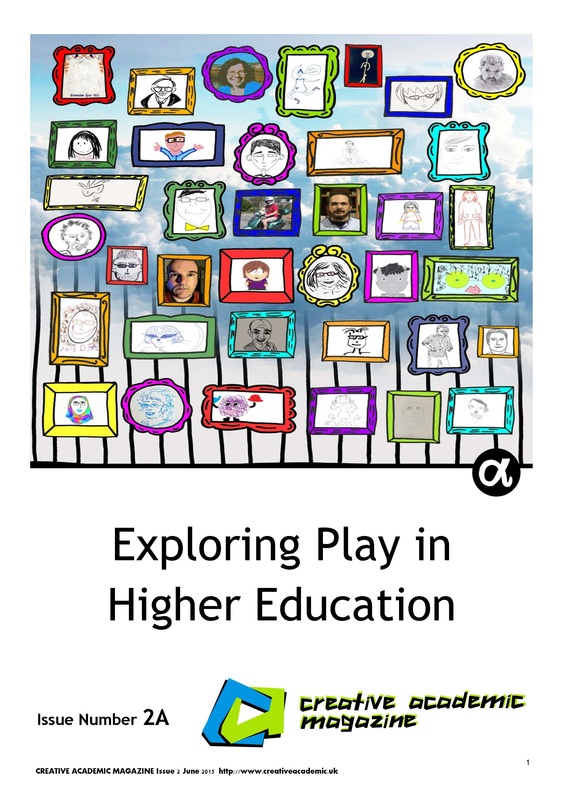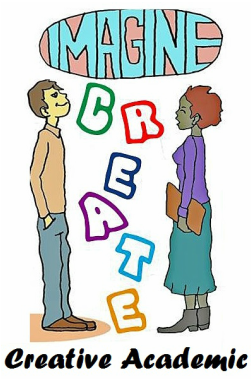
When we first started playing to learn ourselves we realized how ambivalent or polarised responses can be when playful methods are mooted for teaching and research. Some people embrace them wholeheartedly, while others, often in high level roles, or who feel they have a certain kind of accountability, are nervous about the implications and resistant to participating. It is clear from the sheer weight of ideas contained here that many colleagues fall into the first group: however for those outside this ‘magic circle of play’, (as one of our writers describes it) we need to ask the question “Can we afford not to play?”
Einstein said that "play is the highest form of research"(1) and Brown (2) considered that "play is the fertiliser of the brain"; Plato – much cited - argued that you can learn more in an hour of play with someone than in a year of conversation; the political philosopher and professor of law Martha Nussbaum, in setting out her 10 central human capabilities including at no.9
“Play. Being able to laugh, to play, to enjoy recreational activities.”(3,4)
So why then do some of our colleagues feel uncomfortable about play in higher education? Why do they roll their eyes, find numerous excuses not to play dressed up in serious reason and beat a firm and speedy retreat? What are they retreating from? What causes their discomfort? Is part of it about loss of control, or feeling coerced into engagement and out of the tired-sounding-but-true comfort zone? How much of this is within them (and us?) or caused by conventions, traditions, expectations of appropriacy, value, level, context and so on ad infinitum? What is it about our professional roles that constrains us against playing? What is the impact of the clash in beliefs and behaviours between those who are pro-play and those who are against on our learning cultures and environments?
Is part of the problem that we deem play to be trivial or childish? Is it? And if this is the case, why do we think that way? Is play always childish for children? And what does childish actually mean, beyond the dictionary definition? If play is central to our development as human beings why do we draw a line after a certain age? Who dictates when we should cease to play? - and most importantly why? We like the word “childlike”, as denoting the openness to discovery and absence of prejudice and preconceptions: also it has an innocence that the unfortunate conjunction of ‘adult’ and ‘play’ has completely lost.
And what about higher education? Does it exclusively prepare graduates for the world of work? Or does it, and should it do much more than that, as Barnett (5) explores in Imagining the University? We think higher education provides an open and dynamic greenhouse for ideas to grow, develop and evolve for the public good. For us play is a very sophisticated way humans of all ages learn, develop and grow using appropriate play. Why should play suddenly stop when we enter adulthood? Do we stop riding a bike? Do we stop playing goofball/football? Do we stop dancing?
With Stephen Brookfield, Alison has written about the importance of play for learning and creativity (6). How can we nurture the new, the novel, the weird and find exciting ways to combine the uncombinable? The examples we have brought together here show that this is happening already – and outside the pages of CAM too – only think of the work by Sara Ramshaw and Paul Stapleton combining musical improvisation and the study of law. Isn't this what universities should be all about? Isn’t this what research is? What else is happening in the labs that we don’t know about?
And what are the consequences of not playing in any form whatsoever? Colourless, tasteless, emotionless learning? Flat learning, serious learning in every sense of both those adjectives? Not talking, not moving, not feeling? Are we creating silent or silenced sheep in our educators and our learners if we try to constrain play? Silence, of course, has its place – and yet play can be silent and solitary too. However, if we really want autonomous creative and critical thinkers and doers, is silence enough? What else should happen in higher education? Is there a need for more madness, messiness and playfulness – at least among those who thrive on it? How can we challenge misconceptions about play? We think the answer lies in the ideas presented here. We also suggest some of our own ideas in the Reservoir of Possibilities which accompanies the readings, viewing and visuals you will find here.
Explore, enjoy and ride into the chaotic waterfall of play.
References & Notes
1 Einstein play quote. In 1962 the journal “Childhood Education” published an article titled “Play is Education” by N. V. Scarfe that contained the following passage: 2 All play is associated with intense thought activity and rapid intellectual growth. The highest form of research is essentially play. Einstein is quoted as saying, “The desire to arrive finally at logically connected concepts is the emotional basis of a vague play with basic ideas. This combinatory or associative play seems to be the essential feature in productive thought” quoteinvestigator.com/2014/08/21/play-research/
2 Brown, S. (2010) Play. How it shapes the brain, opens the imagination, and invigorates the soul, London: Penguin.
3 Nussbaum, M (online) Women’s Capabilities and Social Justice
http://philosophy.uchicago.edu/faculty/files/nussbaum/Women's%20Capabilities%20and%20Social%20Justice.pdf p232 [accessed 12 May 2015]
4 Kleist, Chad (online) Global ethics: Capabilities Approach, available at http://www.iep.utm.edu/ge-capab/#H3 [accessed 18 April 2015]
5 Barnett, R Imagining the University. Routledge
6 James, A. and Brookfield, S. D. (2014) Engaging Imagination. Helping students become creative and reflective thinkers, San Francisco, CA: Jossey-Bass
Chrissi Nerantzi & Alison James

 RSS Feed
RSS Feed
